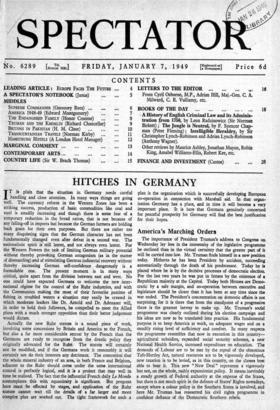America's Marching Orders
The importance of President Truman's address to Congress on Wednesday lay less in the immensity of the legislative programme he outlined than in the virtual certainty that the greater part of it will be carried into law. Mr. Truman finds himself in a new position today. Hitherto he has been President by accident, succeeding automatically through the death of his predecessor. Today he is placed where he is by the decisive processes of democratic election. For the last two years he was put in fetters by the existence of a Republican majority at the Capitol. Today both Houses are Demo- cratic by a safe margin, and co-operation between executive and legislature should be closer than it has been at any time since the war ended. The President's concentration on domestic affairs is not surprising, for it is there that from the standpoint of a progressive there is the greatest leeway to make up. Mr. Truman's social programme was clearly outlined during his election campaign and his ideas are now to be translated into practice. His fundamental purpose is to keep America at work, on adequate wages and on a steadily rising level of sufficiency and comfort. In many respects the programme resembles that now in execution in this country— agricultural subsidies, expanded social security schemes, a new National Health Service, increased expenditure on education. The demands of Labour are to be met by the repeal of the obnoxious Taft-Hartley Act, natural resources are to be vigorously developed, new taxation is to be levied, as in this country, on the classes best able to bear it. This new " New Deal " represents a vigorously but not, on the whole, rashly expansionist policy. It means inevitably a steady growth of Federal authority at the expense of the States, but there is not much spirit in the defence of States' Rights nowadays, except where a colour policy in the Southern States is involved, and here Mr. Truman has reasserted his civil rights programme in confident defiance of the Democratic Southern rebels.






































 Previous page
Previous page